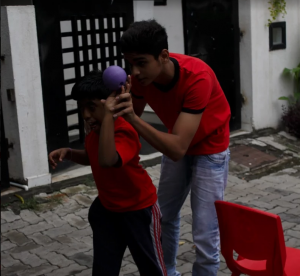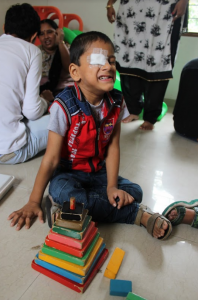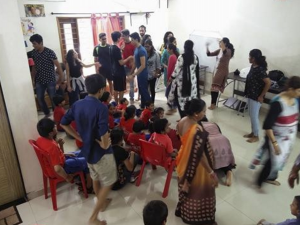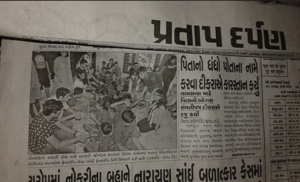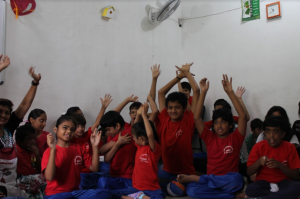MAKE A DIFFERENCE! EMBRACING DIVERSITY!
Proposal stage :
When I was in nursery school, along with me, there were a few kids who were mentally challenged or disabled, they had developmental disabilities. My mother is a psychologist, so because of this, I spent a lot of time and had a lot of exposure to kids who had these disabilities. As I was growing up, I began to notice that these kids were not treated well by the society, they didn’t have equal opportunities according to their abilities, and they were not subjected to kind behavior, so I had a talk about this with some of my friends who were psychology students and it came as a shock to me that even psychology students didn’t know about these kids, and how to behave with them and what they need. This got me thinking…so I researched and found that 2% of the entire world population has developmental disabilities.
I realized that education about mental health is scarce, and it is a global problem, as until mental health education is given to people, suitable treatments can not be formulated and also, people suffering from mental health diseases would never gain acceptance in the global society.
So I talked to my psychology teacher and came up with the idea of initiating a fest where normal kids could interact with special kids to learn more about them and how they live.
I figured that in this way, I could spread this message of global importance on a small scale in my way.
Planning stage :
I along with my friend from my psychology class decided that we should do something about this problem, but our first challenge was…whether we would get participants for this activity. With low hopes we decided to send out forms and surprisingly got an overwhelming response of people who wanted to get involved in our activity.
We then spent a few weeks planning a half-day activity which included art and crafts, sports, games, learning activities. With the help of our parents, we found a school called “Shree Nandan School” who was willing to let us conduct this fest in their school. We regularly worked collaboratively with the teachers of the school, with consistency, and constantly kept updating our participants to ensure that we understood every process correctly as there was a certain way that we had to behave with the kids. We prepared the schedules, and separated the 30 special kids ( ages 5-18 ) in groups according to their intellectual levels. This planning was a new challenge for us, as neither me nor my friend had organized an event before, and more importantly, an activity of this scale regarding special kids and mental health.
However, we were motivated to play our part in spreading this message so we worked hard. One important ethical consideration I remembered ( thanks to IB psychology ) was to make consent forms for the parents of the special kids, which we sent to them 3 days prior to the event.
Everything was going smoothly, all our activities were planned, we had gotten all the resources, Dhyay and I went to the school 2 days before the event and helped to set everything up…but that day itself, our school announced that there was an important compulsory meeting on the same day as our event.
We got really scared as all our participants would be going to this meeting, and we wouldn’t have any participants at all, I called the teacher up and she said that she had already informed the parents so we could not postpone the event.
Getting 30 new participants before 24 hours was BIG CHALLENGE for us! We didn’t know who we would convince, how we would explain everything to them so quickly, however, with collaborative work of our volunteers, and my friends, we somehow managed to get a few participants, even then, we were still very anxious about our event.
Execution stage :
Finally, the day of the event had come and Dhyay and I reached there early, and with the help of the teachers and volunteers, we were able to quickly prepare everything and set everything up.
We held a minor session to educate the participants about how to behave with the kids, which activities to perform, we sorted the participants in groups as well and told them the work they would be required to do as a team.
Throughout the day we engaged in various activities with the kids. We would rotate the groups so that everyone would have a chance to interact with kids of all intellectual levels. Everyone worked collaboratively, whether it was making the acts indulge in craft activities, or whether we needed help in moving around the groups. Because of the learning of our school policies, everyone was also very careful not to waste the resources like paper, paints, colors etc. Through efforts together, the entire event went smoothly.
Creativity
– Puzzle making
– Friendship bracelet making
– Poster making
Action
– Cricket
– Musical Chairs
– Games
After all the activities were over, we spent some time just talking to the kids and dancing with them. One of the best feedback we got was that one special child who hadn’t talked in 3 weeks had spoken because of the efforts of one of our participants. We tied friendship bracelets and then gathered around in a circle to talk about our experiences. We got great feedback from our participants about how this experience had created a difference in their mindsets about mental health, what they had liked and what they thought could’ve been done better.
( We also sent a form later on so that we could incorporate these suggestions the next time we organized something like this )
We got featured in a newspaper…So that was a matter of great pride for us!
Organizing this event taught me quite a few things –
1) Quick thinking – This was required when we had to get participants 2 days before the event
2) Consistency – Throughout the planning of the activities, we had to be consistent with our meetings with the school so as to ensure proper execution of the activities
3) Ethical concerns – We had to prepare consent forms for the parents of the special kids and also inform our participants about what was expected of them. We also had to be careful that we did not waste the resources.
4) Appreciation – I gained a lot of appreciation for teachers, as I realized the amount of hard work they put in every single day for the students so that they have the best facilities.
5) Reflection – The teacher taught me that after organising such an event, we should always take feedback from the participants about what they learnt, what they liked, what they expected more. I took this suggestion and collected reflections and they gave me a very helpful and deep insight into how I could improve this initiative the next time I do it.
A few areas, which I identified that I could work on, were –
1) Leadership skills – On such busy events, I realized that it is important to take decisions rationally and take the charge, which is something I’d want to work on so that I can lead better in future events.
2) Backup – We should always have backup help, and resources, for eg – that day we did not have enough activities and materials to play games with., so we could have preplanned accordingly.
3) Patience – I realized from my activity, that there a lot of people who have disabilities and are not as blessed as we are, and to help them and understand them, we require a lot of patience. This quality could be practiced in our daily relationships as well.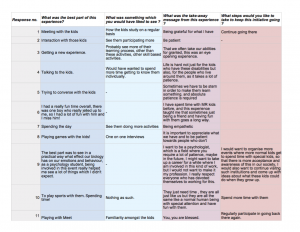
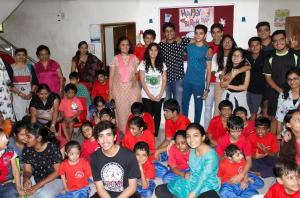
Final takeaway :
After spending time with these kids, I realize that society needs to work a lot on awareness about mental heath, there are a lot of misconceptions which need to be cleared and we, as society members need to do our own basic human duties to make people with these disabilities feel accepted in our society. I learnt that intelligence is a gift which we often don’t value, and we keep whining about things we don’t have, when in reality, we are truly blessed. Patience is something that is a necessity when we are spending time with these kids, but their response and honesty is truly rewarding.
I aspire to go into the field of psychology, therefore, this event was really close to my heart but I also realized that the field of special education was not something I would do, as I do not have the patience in me to give my best to this field.

